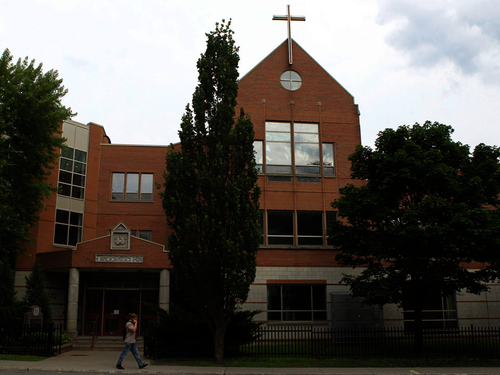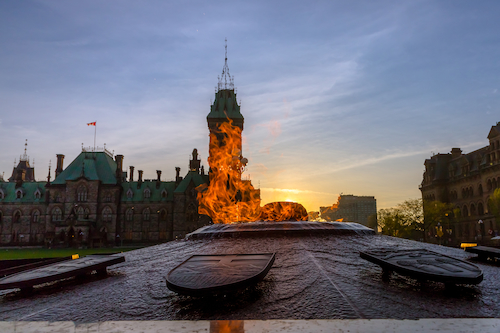This week on the ChristianWeek website, Cardus president Michael Van Pelt shed some light on why this organization decided to stand with Loyola High School in its fight for freedom: "Standing with others against insinuation of that hesitancy, and that fear, in the hearts of Canadians of religious faith is what drives Cardus daily. It is what led us to stand with little Loyola High School in Montreal as it took its case all the way to the Supreme Court of Canada on March 24 this year. "When we were first drawn to the case, not as activists but as a think tank able to provide intellectual and communications support, people frequently asked why an Ontario organization drawn from the Protestant tradition would concern itself with the fate of a private Catholic school in Quebec. Full disclosure: we asked it of ourselves." Read the rest of the article here.

‘Fight for freedom goes beyond the courtroom,’ says Cardus president
April 9, 2014

Peter Stockland, publisher of <i>Convivium</i>, featured on CBC Calgary to discuss Quebec election results
This morning Peter Stockland, publisher of Convivium and resident of Montreal, was featured on CBC Calgary's The Eyeopener to discuss what Quebec election results with host David Gray. "It was a debacle for the PQ and it's going to take years for them to recover, if they ever do," said Stockland. "In this campaign, [Mme Marois] tried to play both sides against a kind of amorphous middle throughout the campaign, and she ended up, in a sense, losing contact with reality. She brought in an extreme corporate figure like Pierre Karl Péladeau, who's known as a very right-wing guy, into essentially a social democratic party and then had him—or he decided to—tout sovereignty at a time when they were trying to soft-pedal sovereignty ... There was a fundamental incoherence to what has been perceived as her strength: the ability to read the political winds." Listen to the entire clip below.
April 8, 2014

<i>Convivium</i> publisher sounds off about the Quebec election
Convivium publisher Peter Stockland wrote about québécois politics in the Calgary Herald, giving perspective to the threat of sovereignty. "It does no good, either, to blame the blather on the generalized woeful state of election campaigning everywhere. Whether or not we accept Quebec’s long-standing claim to constitutional exceptionalism, there is no doubt that the combined fiscal, demographic, linguistic, cultural and political trials looming over it are uniquely daunting. It has more dire need than most to carry out an effective democratic politics, and less time than any to put those politics into meaningful practice." Read the full piece at the Calgary Herald website.
April 4, 2014

Cardus president quoted in National Post coverage of Loyola case
Eight years after the Supreme Court of Canada unanimously rejected Quebec’s ban on Sikh kirpan daggers in the classroom, another major test of academic religious freedom comes to Canada’s top court Monday, as a private Catholic boys high school in Montreal fights for the right to teach ethics and religious culture in its own Jesuit style. This time, though, legal arguments from the school, the province, and several religious intervenors from across the country, will be made in the strained climate of an election campaign dominated by Quebec’s cultural insecurity and vulnerability, epitomized in the governing Parti Québécois’ proposed Charter of Values. “In a certain sense, the situation has become more tense,” said John Zucchi, a McGill University history professor who was a plaintiff in the original case, on behalf of his son, Thomas, then a student at Loyola High School. The course was created by the Liberal government of former premier Jean Charest, but the PQ has magnified this tension, Mr. Zucchi said, by “pandering” to narrow interests and confusing the fundamental issues of accommodation. The basic principles of that philosophy trivialize and, for all practical purposes, negate religious experience and belief The basic question, as trial judge Gérard Dugré put it, is “whether the state can secularize the teaching of religion and morality within the very walls of a private Catholic denominational school.” The answer cuts to the heart Quebec’s post-Catholic secular identity within a multicultural Canada. First taught in 2008, Quebec’s mandatory high school course in ethics and religious culture is, as Judge Dugré wrote, “the culmination of the process of secularization of public schools undertaken by the Quebec government… in that it secularizes the teaching of ethics and religious culture.” The course embodies a “relativistic philosophy, commonly known as ‘normative pluralism,’” the judge wrote. “The basic principles of that philosophy trivialize and, for all practical purposes, negate religious experience and belief.” Private schools like Loyola may be exempted from teaching it, provided they offer another “equivalent” course. Much disagreement sprung from the interpretation of that word. In their 2008 request for exemption, the school said “our students are very well trained in the key values proposed by the new program, but that training is carried out in a manner respectful of the Catholic faith and the moral values that form the cornerstone of our school.” The province refused, saying the Loyola program “does not lead the student to reflect on the common good, or on ethical issues, but rather to adopt the Jesuit perspective of Christian service.” In his 2010 ruling, which quashed the province’s refusal on religious freedom grounds, Judge Dugré noted the province’s order “places Loyola in an untenable position: either it teaches the ERC program required by the Minister and thus violates its religious precepts, or it teaches the ERC course with its own program and thus violates the Act.” THE GAZETTE / John Kenney In December, 2012, Quebec’s Court of Appeal granted the province’s appeal, affirmed the minister’s original decision, and set the stage for this week’s Supreme Court hearing. Michael Van Pelt, president of the Christian-focused think tank Cardus, said a key legal question is whether religious freedom is a right of an institution, not just individuals. The answer is not clear. Judge Dugré clearly found that, as an institution, Loyola has religious freedom and it was violated. But by the letter of the law, that was something of a leap. Both the federal Charter, and Quebec’s Charter of Human Rights and Freedoms, say rights belong to people (“Every person” in the Quebec one, “Everyone” in the Canadian one). They do not mention institutions. A broader concern, Mr. Van Pelt said, is whether this refusal of Quebec to allow a private Catholic school to teach ethics and religious culture from a religious perspective reflects the kind of country Canadians want to live in. Do we want to create this kind of hesitancy among religious institutions in Canada? A ruling against Loyola would mean any religious institution that works in the public interest would be hesitant to express its own values in Canadian public life, he said. Religious service groups, from schools to charities, regularly display a connection between deeply held beliefs and day to day actions. “Do we want to create this kind of hesitancy among religious institutions in Canada?” Mr. Van Pelt said. “If we have a negative judgment at the Supreme Court on this, that continuity gets broken,” he said. “This is not the kind of social architecture we want to build in this country.” Loyola is named for Saint Ignatius of Loyola, founder of the Jesuit order, famous for its scholarship and intellectual engagement. Pope Francis is the first Jesuit to become Pope. Mr. Zucchi’s son Thomas, 19, has since gone on to university, but he received the school’s preferred style of education because of the original court victory, which Mr. Zucchi said helped him prepare for the demands of higher education. But the wider problem is not resolved. “I’m more optimistic at the Supreme Court level than I was as the [Quebec] appeal court level,” he said. “I think religious rights are taken very seriously.”
March 24, 2014

Who owns our kids?
In the Ottawa Citizen, André Schutten writes on Loyola High School and mentions Cardus research: The state’s role in education is to ensure a certain quality of education is achieved. It ought to be interested in the ends (literacy, numeracy, civic competency, etc.), not the means parents choose. A comprehensive sociological study by Cardus, a Canadian think tank, found that independent religious schools are statistically a better means to the end: they produce graduates who are more invested in the common good, donating more, volunteering more and more civically engaged. Based on the social-scientific evidence, independent religious education contributes to and serves the common good. Québec’s pedagogical approach severely undercuts the very good work of independent religious education. Read the rest of the article here.
March 23, 2014

<i>Convivium</i> publisher quoted in <i>The Globe and Mail</i>
From "Pope Francis is 'making me think about my life'" written by John Allemang and published last weekend in The Globe and Mail: "If it's unsettling, it's not in a way that says, 'I'm going to take my rosary and go home,'" says Peter Stockland, publisher of Convivium, a conservative-leaning magazine that defends the role of religious faith in public life. Mr. Stockland doesn't consider Francis a subversive; he sees him as restating the authentic message of the faith that was somehow obscured under popes less gifted at catching the wider world's attention. "I hear his name coming up in conversation with people who I never imagined would even know the name of the Pope, never mind his message. Others may disagree, but the notion that there's a discontinuity in the message is something of an illusion. The message is very consistent with Benedict and JPII. … What Francis has said may be more media-savvy and palatable; maybe people are more open to hear him because of his expression and demeanour. But the message is not radically different at all." Read the whole article online.
March 8, 2014

‘Boring’ budget positions Tories for 2015 election debate
The Catholic Register quotes Cardus in budget rundown: "Overall this is a budget about jobs, economy, returning to surplus and setting the stage for the 2015 election campaign," said Ray Pennings, co-founder and vice president of Cardus, a think tank focused on the flourishing of Canada's "social architecture" or civil society institutions and groups such as churches, charities and labour unions. Pennings sees the budget, introduced Feb. 11, as "setting the stage for significant debate for what the task of government is vis-à-vis the middle class," noting the Conservatives see the middle class as "workers and consumers." The New Democrats focus on supporting the middle class, almost seeing them as dependent on government, he said, while the Liberals appeal to the middle-class aspirations, looking at how government can help middle-class families meet them. Read the rest of the article here, and then check out Cardus's own full coverage of the budget, complete with analysis and on-the-scene video.
February 12, 2014

News release: Minister Kenney’s appearance at Canada’s New Industrial Revolution
Minister Jason Kenney says that addressing the skills mismatch is key to strengthening Canada's economy, this morning at Cardus's Work and Economics conference. Click here to read more. January 23, 2014– Toronto, ON – Employment and Social Development Canada Today at a conference hosted by Hamilton-based think tank Cardus, the Honourable Jason Kenney, Minister of Employment and Social Development, highlighted the need to fix the skills mismatch in Canada to ensure Canadians can benefit from economic growth. In the coming years, hundreds of resource projects are planned that will create hundreds of thousands of jobs from coast to coast to coast. In addition to the direct jobs created by these projects, investments in infrastructure and machinery represent even more opportunities for Canadians. In his speech, Minister Kenney outlined the steps required to ensure that Canadians have the skills they need to fill these jobs and ensure Canada can take full advantage of this opportunity. More employer-led training through the Canada Job Grant, more employer investment in training and increased wages, reforms to Canada’s apprenticeship systems, encouraging more Canadians to enter the skilled trades, better recognition of foreign credentials, improved labour mobility and better labour market information were some of the solutions identified by Minister Kenney. Quick facts The Association of Canadian Community Colleges says that over the next 10 years Canada’s labour market will need approximately 1.5 million new workers to keep up with demand. Experts in the construction sector say they will need 319 000 new workers before 2020, while the mining industry will need 145 000 more workers in the next decade. The Conference Board of Canada says Ontario alone is losing out on $24.3 billion in economic activity because employers can’t find people with the skills they need. Quotes "Our government is working to fix the paradox of too many people without jobs in an economy of too many jobs without people by helping Canadians get the training they need. Only by addressing this skills mismatch will we be able to ensure that Canadians can fully benefit from the tremendous opportunities before us." - Jason Kenney, Minister of Employment and Social Development and Minister for Multiculturalism Additional links Economic Action Plan 2013 introduced various measures to support the labour market. Apprenticeship Grants Canada Job Grant Labour Mobility
January 23, 2014

Canada’s New Industrial Revolution featured in Daily Commercial News
"'The construction side of oil, gas and energy extraction involve Ontario quite heavily,' said Brian Dijkema, Program Director, Work and Economics at Cardus. Dijkema says Ontario is one of the key places that is developing parts for pipeline projects and other facilities." Read the full article , and then head over to cnir.cardus.ca to learn more about this conference.
January 21, 2014
Media Contact
Daniel Proussalidis
Director of Communications
